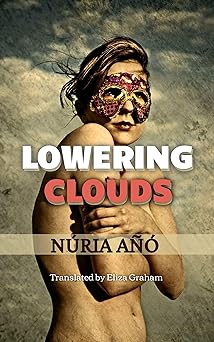 About Lowering Clouds (English Edition):
About Lowering Clouds (English Edition):
Gabriele is an actress who, as her career approaches its end, takes a trip to the city where she spent her adolescence. Her sudden visit awakens something unexpected in two of her friends, who see in her an escape from their grey, monotonous days. Through her friends, the actress sees the life she could have had. The burden of fame has been pursuing her for forty years, and only one thing is evident: this trip awakens passions and changes the lives of everyone she visits.
“What Núria Añó gives us in this book is a piece of real life, dissected with the razor-sharp scalpel of her writing. This work contains great use of language and style. The novel is not easy, either its subject or its style, but it is very interesting and, in my opinion, is one of the great promises of contemporary Catalan writing.” –magazine on literary and comparative literature studies, L’Ull crític, No. 15-16
“With her unmistakable style, the author gives us a glimpse of daily life through the eyes and thoughts of the narrative voices of the book’s different characters. It is a succession of spontaneous and profoundly human snippets which, although with a touch of irony, capture the bitterness of regret and the nostalgia of past times, but also the hope of a new start.” –Cinzia Rizzotto, Translator
About the author: NÚRIA AÑÓ (Lleida, 1973) is a Catalan/Spanish writer. Some of her works, including novels, short stories, and essays, have been published and translated into Spanish, French, English, Italian, German, Polish, Chinese, Latvian, Portuguese, Dutch, Greek, Arabic, and Romanian. Her first published novel, Els nens de l’Elisa (Omicron, 2006) was awarded third prize in the 24th Ramon Llull Novel Award, one of the most prestigious awards for Catalan literature, awarded by Editorial Planeta. L’escriptora morta ([The Dead Writer, 2020] Omicron) was published in 2008; Núvols baixos ([Lowering Clouds, 2020] Omicron) in 2009; La mirada del fill (Abadia) in 2012; El salón de los artistas exiliados en California ([The Salon of Exiled Artists in California], 2020) is a biography of screenwriter Salka Viertel. Núria won the 18th Joan Fuster Prize for Fiction Ciutat d’Almenara, fourth place for international writing at the 2018 Shanghai Get-Together, and has been awarded with prestigious international grants: Nuoren Voiman Liitto (Finland, 2016), Shanghai Writing Program (China, 2016), Baltic Centre (Sweden, 2017), IWTCR (Greece, 2017), Krakow UNESCO City of Literature (Poland, 2018), IWTH (Latvia, 2019 and 2023) and IWP (China, 2020).
Her writing centers around her characters’ psychology, often through the use of anti-heroes. Núria’s characters are the focus of her work, and are generally more relevant than the topic itself. With introspective reflections that are feminine rather than sentimental, she finds a unique balance between the marginal worlds of parallels. Her novels explore a wide variety of topics, delving into important social and current themes, such as injustice or lack of communication between individuals. The basic plot of her novels does not tell you everything there is to know. By using this method, Añó seeks to involve the reader so they ask their own questions to discover the deeper meaning of the content.
Buy the book:
Author Bio:
NÚRIA AÑÓ (1973) es escritora y traductora. Su primera novela “Els nens de l’Elisa” (2006) queda tercera finalista en el XXIV Premio Ramon Llull de novela. Siguen “La escritora muerta” (2008), “Nubes bajas” (2009), “La mirada del hijo” (2012) y “El salón de los artistas exiliados en California” (2020).
Añó gana el XVIII Premio Joan Fuster de Narrativa Ciutat d’Almenara, el cuarto premio internacional de escritura 2018 Shanghai Get-Together y ha sido galardonada con las prestigiosas becas: NVL (Finlandia, 2016), SWP (China, 2016), BCWT (Suecia, 2017), IWTCR (Grecia, 2017), UNESCO City of Literature (Polonia, 2018), IWTH (Letonia, 2019 y 2023) o IWP (China, 2020). Más información en www.nuriaanyo.com
LLIBRES EN CATALÀ: “Els nens de l’Elisa” (2006), “L’escriptora morta” (2008), “Núvols baixos” (2009) i “La mirada del fill” (2012).